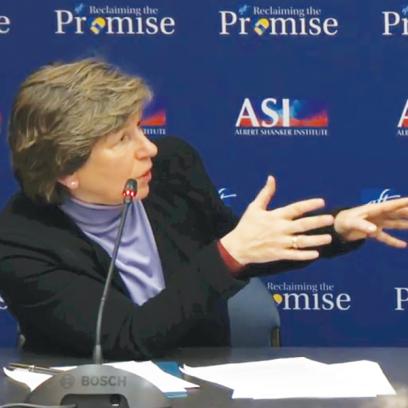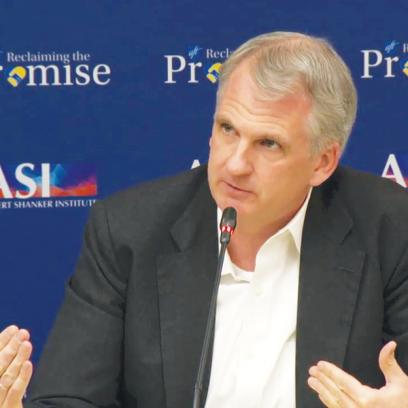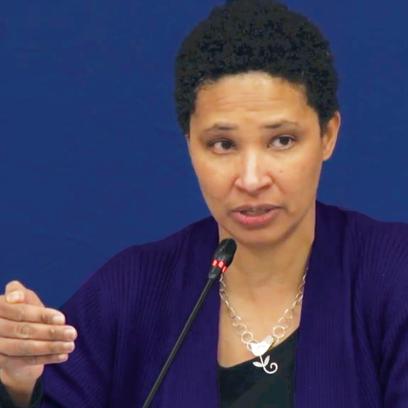On Wednesday, January 10, the American Federation of Teachers and the Albert Shanker Institute cosponsored a panel moderated by AFT President Randi Weingarten on the role that American education should play in responding to the threats confronting our democracy. Two leading public intellectuals, Timothy Snyder, the Richard C. Levin Professor of History at Yale University and the author of On Tyranny: Twenty Lessons from the Twentieth Century, and Danielle Allen, the James Bryant Conant University Professor at Harvard University and the director of Harvard’s Edmond J. Safra Center for Ethics, discussed the importance of civics education in preserving our republic and sustaining the American ideals of liberty and democracy. Below is an excerpt of their wide-ranging conversation.
–EDITORS
Randi Weingarten: In the 2016 presidential election, 3 million more people voted for the person who is not president. About 77,000 votes in Michigan, Pennsylvania, and Wisconsin decided the election. In Alabama, 22,000 votes decided the recent Senate election. Yet, a University of Wisconsin–Madison study on voter suppression showed that as many as 45,000 people statewide in Wisconsin were deterred from voting in 2016 by state ID laws.
Why do I say all this? Because clearly voting matters, and clearly the policies, practices, and constitutional norms in this country change radically based upon who is in office. And that has probably never been clearer than in the last several months.
This may be the social studies teacher in me, but I’m hoping that after so many years of people rolling their eyes when it comes to any conversation about democracy or civic engagement, we’ve actually arrived at a new stage in the conversation, which is: How do we make civics real in our classrooms and in our communities?
And frankly, that’s why we asked the two people with us today, Danielle Allen and Timothy Snyder, to help us make sense of this moment. For our members and for all educators, I’m hoping they can answer two fundamental questions: How do we teach about democratic citizenship when democracy is at risk, and how do we build a new sense of civic engagement?
Timothy Snyder: For me as a citizen, American democracy is aspirational. Before 2016, there were already significant ways in which the United States was not a democracy. I would say thanks to two Supreme Court decisions, Citizens United v. Federal Election Commission in 2010 (which legalized unlimited political spending by corporations) and Shelby County v. Holder in 2013 (which weakened the Voting Rights Act), we were actually moving away from and not toward democracy, even before the election. For example, when I hear about the many recent cases of gerrymandering, I think of the 1920s and 1930s, when tiny East European dictatorships did exactly the same thing.* They drew up electoral districts so that one ethnic group would always win.
It’s clear that after watching President Trump for a year in office, this is not an individual who feels comfortable within a rule-of-law state. This is not an individual who feels comfortable with constraints. His behavior constantly violates the norms that we took for granted, which hold our democratic system together.
These behaviors include an admiration for foreign dictators, such as Vladimir Putin, Recep Tayyip Erdogan, and Rodrigo Duterte, which tells you what kind of system he would like to be in. The fact that he cannot tell the truth is not just a quirk, and neither is his way of speaking about U.S. history. The slogan of his administration is “America First.” In the 1930s, the phrase was used by people who opposed Roosevelt’s New Deal and immigration to the United States, including that of Jewish refugees from Europe. In 1940, America First was the name of a movement that opposed war with Nazi Germany. Its spokesman, Charles Lindbergh, believed that Americans had more in common with Nazis than with people of color. To use the phrase now is to suggest a kind of alternative history, where America never entered the war and never asserted any values.
I find it interesting that Trump and White House chief of staff John Kelly refer to the Civil War as a war that could have been avoided. That’s revealing about the kind of country they think they want to be in, or they think is possible. A country where we didn’t need to fight a civil war, where reasonable people could have made a deal, where slavery could have reasonably continued for decades.
It’s very important for us not to say we had this democracy, and now it’s under threat. Instead, we must recognize that we started from an imperfect starting point, and Trump is helping us see a lot of the problems that were incipient in the system.
Danielle Allen: I think we should spend a little less time thinking about Trump, and we should spend more time thinking about the American people—who we are and what we need to be. I want us to think about our institutions for a second—all the big buildings in Washington, the U.S. Capitol, the Supreme Court, and the White House. Those constitute an asset, a huge body of property that in many ways is owned by all of us.
These institutions are a concrete form of knowledge. Our country’s founders in the 1700s, and throughout the 1800s, tried to think through this question of how ordinary people, not aristocrats—men, yes, but ordinary people—can do collective decision making together. They conceived of a way to build institutions in order to check power, and in order to distribute power in an egalitarian way, which contrasted with what they knew from Europe.
They built institutions, these deposits of knowledge. Now, the problem with storing knowledge that way is people lose sight of the fact that those institutions are actual treasuries of insight, wisdom, and discovery. I would say that this democracy has been at risk for decades, because we, the people, have lost the knowledge that went into building those things. Consequently, we barely know how to operate them.
Even before the presidential election, my worry had been focused on young people. Were they getting enough time on civics? Were they getting enough time not just to learn about the structure of institutions but to understand the nature of agency, of personal empowerment; the personal skills of speech, of interaction with other people, of imagination; and the courage necessary to operate democratic institutions?
Then after the election, I got so many calls and inquiries from people who wanted to know what to do. They didn’t know what to do, and that really blew me away. I literally had to sit down with people and say, “OK, here’s how you run a meeting. Here’s how you start brainstorming what the problems are in your community, in your city, in your state, and then get to the country. Here’s how you prioritize. And once you figure out what are the things you care most about, here’s how you find your menu of policy possibilities. And here’s how you start evaluating which ones are the best ones, and here’s how you find allies to help you advance that cause.”
To me, this stuff is really basic, and I think it’s probably basic to anybody who’s been part of an organizing tradition. But that knowledge is almost gone through most of our society. So we have a big job to do to recover the bodies of knowledge that once upon a time were deeply embedded in our culture.
How does this relate to issues of race and equity? This country has been plagued by racial injustice from the beginning. We sit at a moment where very soon no particular ethnic group will be in the majority. But we’ve never known how to operate political systems where that’s true. We’ve operated political systems for centuries based on the conception that somebody was in the majority and somebody was in the minority. So, the fact of the matter is, as we work toward building an equitable, multicultural society, we don’t just have to recover bodies of knowledge that we’ve lost; we simultaneously need to innovate, to develop egalitarian institutions in a multicultural context. My metaphor for all this is that we have to rebuild the ship while we’re trying to sail it. That’s the challenge we face.
RW: I would argue that if Leo Casey, the executive director of the Albert Shanker Institute, and I were still teaching in high schools, and teaching our juniors and seniors, we would talk about how democratic citizenship is essential to preserving and nurturing democracy. And we would talk in our classes about how voting is a sacred right and responsibility of every citizen, and the government’s job is to promote the broadest possible involvement of citizenry in the elections. As Tim has already said, that is the aspiration.
Even when I was teaching in the 1990s, there was still a consensus about that aspiration. It was well before all of today’s voter suppression. What’s interesting now is that political polarization is the lens through which everyone looks at everything. As a result, even when you start talking about wanting more people to vote, which is what we used to teach, that is now a political issue, not a democracy issue. How can we navigate this age of polarization and teach the importance of democratic citizenship?
DA: It’s a really hard question. At some level, I think in communities across the country, we do need to rebuild cross-ideological alliances. Forget about solutions for the moment. Can we even imagine cross-ideological problem-exploration conversations? Fortunately, there are people working on this. There is a man named Bill Doherty at a program called Better Angels,† which actually started a few years before the election, and it has exploded since then. He’s a psychologist and a family therapist, and he builds projects that bring together people who are on opposite sides of a divide, not always partisan.
For example, one program in Minneapolis brings together police officers and African American men who have a lot of exposure to the police. It takes a lot to build up the trust that makes it possible to do meaningful problem solving. I think we need an expansion of efforts like that. I know of another group of people in Ohio working on a shared values initiative to build workshops that bring together people from divergent positions around basic concepts of liberty and justice for all. If we can rebuild cross-class alliances, we can rebuild our capacity to do problem solving throughout the country. Then you start to have more capacity to talk about things like voting again, and not have that fall into a polarized partisan trap.
TS: Voting is one of the very few times we actually get our bodies out to do anything that involves the entire country. It seems to me that a common thread in some of Danielle’s answers has to do with precisely that. You have to get your body out and do something. These conversations about what we might have in common, recognizing problems, even if we don’t know solutions, require face-to-face discussions. It just doesn’t happen over the Internet.
You can bring people out to the street by mobilizing them through the Internet, you can do cool stuff with the Internet, but you can’t have that kind of conversation. I think the reason for that has to do with recognition. You have to see the other person and recognize him or her as a human being. So, one of the things that has happened to us, which has made all this much more difficult—and it gets to the polarization and the question of what it means to be a citizen—is that it’s just much easier to not recognize somebody as an individual, as a human being, if you’re on the Internet.
The whole point of education is to create individuals. It takes a huge amount of collective investment. If you want to have a nation, you must invest in education to create individuals, and that’s where we have punted, I think, in the last quarter century.
DA: Creating individuals requires educating young people for civic agency. They need to know how to identify community problems, how to articulate the problem, how to find people who also care about that problem, and how to brainstorm solutions. Then they need the basic know-how of, well, given this is the problem, what are the levers to pull to change it?
For us to make progress on rebuilding civics education, we need to let that conversation really operate at the level of the states and accept a diversity of approaches. But we must recognize the importance of teaching civic bodies of knowledge. For instance, in the vast majority of states, there is a requirement, primarily in high school, to teach the Declaration of Independence and the Constitution.
But the Declaration—you can hang a heck of a lot of stuff on the Declaration. It’s a “how-to” manual. That how-to manual goes, first, you’ve got to figure out what your problem is and draw up a list of grievances. Then you’ve got to figure out what your values are: all people are created equal and we should build governments to provide for our safety and happiness together. And then, you have to put together your grievances and the things you care about in a rhetorically effective structure that will bring you allies, like Spain and France, not to mention everybody else in the colonies. And, you’ve got to be committed to some actions at the end of it.
TS: The Declaration also talks about what happens in the course of human events. This is why history is so important. In the last 25 years, we really have lost track of history. I say this as somebody who spends a lot of time talking to Americans about history. We’ve gotten ourselves into a mental state nationally where we think that everything is just the way it is, and that it has to be this way. Until everything changes, and then we have no idea how to react to it.
If you don’t know what I’m talking about, think back to November 2016. Some of us said, “Nothing like this has ever happened before to anyone. So, what can we possibly do?” What percentage of the American population reacted like that? History tells us that not everything is totally new, that shocks are normal.
We find ourselves in a historical moment where the consequences of choices, in education and in civil life generally, are magnified and profound. Education means precisely becoming that active individual, that citizen, who is able to recognize his or her place in history and act in time and act to good effect. It just so happens that we’re in a moment where the course of human events is flowing. We’re at a moment where what we decide to do has multiplying effects down the generations.
*For more on how tyranny in European history can inform our country’s current political climate, see “History and Tyranny” in the Summer 2017 issue of American Educator. (back to the article)
†More on Better Angels. (back to the article)



